In today’s fast-paced digital world, businesses face growing complexity. With multiple sales channels, expanding product catalogs, and increasing customer expectations, relying on standalone systems is no longer enough.
ERP system integration provides a solution, connecting your ERP software systems with eCommerce platforms, CRM tools, and Product Information Management (PIM) systems. This integration enables seamless workflows, accurate real-time data, and better decision-making.
What is ERP System Integration?
ERP system integration connects your ERP software systems with other enterprise platforms, creating a unified ecosystem. By integrating your ERP, businesses can:
- Synchronize inventory, pricing, and orders across multiple systems
- Reduce manual data entry and errors
- Improve reporting and analytics
- Enhance collaboration across departments
For instance, when a customer places an order online, integrated systems automatically update inventory, inform the CRM of the new order, and trigger invoicing in the ERP.
Why ERP Integration Matters for Modern Businesses
ERP integration is essential to thrive in today’s competitive landscape. Key benefits include:
- Data Accuracy: Eliminates errors caused by manual entry
- Operational Efficiency: Automates workflows like order processing and inventory updates
- Enhanced Customer Experience: Provides accurate product and order information
- Scalability: Allows businesses to grow without adding complexity
Key Types of ERP Integrations
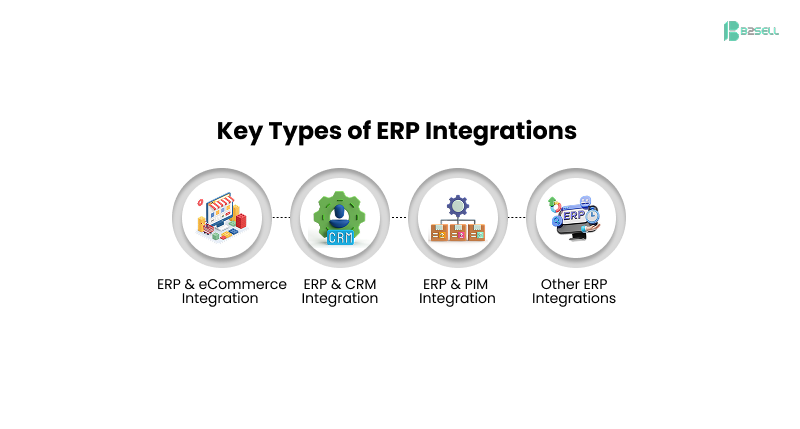
ERP & eCommerce Integration
Integrating ERP with your eCommerce platform ensures that product catalogs, pricing, inventory, and orders remain synchronized. Benefits include:
- Real-time inventory updates
- Faster order processing
- Accurate pricing and discount application
- Reduced errors in order fulfillment
B2Sell supports integrations with platforms like Magento, Shopify, BigCommerce, and Salesforce Commerce Cloud.
ERP & CRM Integration
ERP-CRM integration connects customer data, sales history, and financial information. Advantages include:
- Accurate customer data for support and sales teams
- Streamlined sales and marketing campaigns
- Improved customer service and loyalty programs
ERP & PIM Integration
PIM systems manage product content such as descriptions, images, and specifications. Integrating PIM with ERP ensures:
- Consistent product information across all channels
- Automatic updates of pricing, inventory, and attributes
- Reduced errors in product listings and catalogs
B2Sell’s PIM integration ensures seamless multichannel product management.
Other ERP Integrations
ERP integration can also include:
- HR Systems: Automate payroll, attendance, and employee management
- Business Intelligence Tools: Enable advanced analytics and reporting
- EDI Systems: Streamline supplier communications
- IoT and Manufacturing Systems: Monitor production and automate replenishment
Key Features of ERP Systems
ERP (Enterprise Resource Planning) systems are designed to centralize and streamline business operations across departments. Key features include:
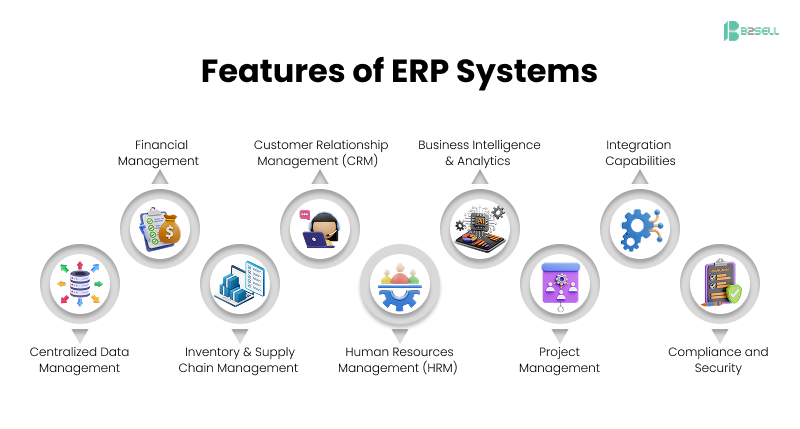
1. Centralized Data Management
- Consolidates data from finance, inventory, sales, HR, and operations
- Eliminates duplicate entries and inconsistencies
- Provides a single source of truth for decision-making
2. Financial Management
- Handles accounts payable and receivable, general ledger, budgeting, and reporting
- Supports compliance and auditing
- Provides real-time financial insights
3. Inventory & Supply Chain Management
- Tracks inventory levels, stock movement, and warehouse management
- Optimizes procurement, order processing, and supplier management
- Reduces stockouts and overstocking
4. Customer Relationship Management (CRM)
- Integrates customer data, sales history, and communication records
- Supports sales pipeline management, customer segmentation, and loyalty programs
- Enhances customer service with real-time order tracking
5. Human Resources Management (HRM)
- Manages payroll, attendance, recruitment, and performance evaluation
- Centralizes employee data and simplifies HR workflows
- Enhances workforce planning and compliance
6. Business Intelligence & Analytics
- Provides dashboards, reports, and KPIs across departments
- Enables predictive analytics and data-driven decisions
- Supports operational, financial, and strategic planning
7. Project Management
- Tracks project timelines, resources, and costs
- Supports collaboration among teams
- Improves project delivery and efficiency
8. Integration Capabilities
- Connects with eCommerce platforms, PIM systems, CRM tools, and third-party applications
- Enables real-time data flow across all business systems
- Supports automation of critical workflows
9. Compliance and Security
- Ensures regulatory compliance in finance, HR, and operations
- Provides role-based access controls and audit trails
- Protects sensitive business and customer data
Benefits of ERP System Integration
ERP systems deliver a wide range of advantages that can significantly improve business performance:
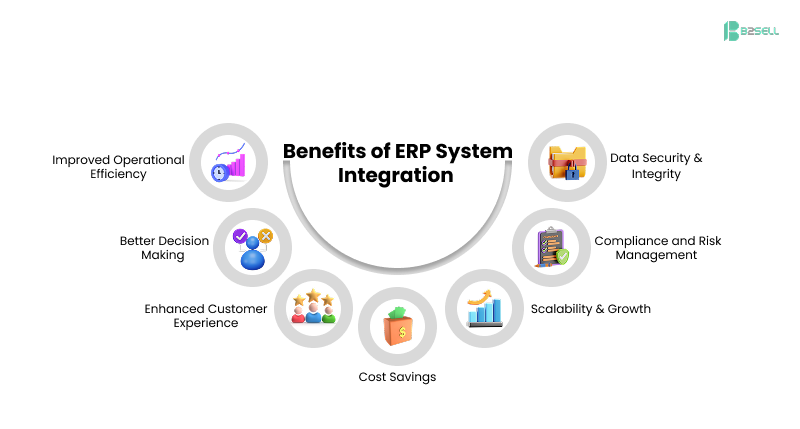
1. Improved Operational Efficiency
- Automates repetitive tasks, reducing manual errors
- Streamlines workflows across departments
- Enhances productivity and reduces operational costs
2. Better Decision-Making
- Provides real-time data and analytics
- Supports forecasting, budgeting, and strategic planning
- Enables informed, data-driven decisions
3. Enhanced Customer Experience
- Provides accurate product and order information
- Speeds up order fulfillment and service delivery
- Improves customer satisfaction and loyalty
4. Cost Savings
- Reduces administrative overhead and duplication of work
- Minimizes inventory mismanagement and stock-related costs
- Optimizes resource allocation
5. Scalability & Growth
- Adapts to business expansion and new operational processes
- Supports multi-location, multi-channel operations
- Allows easy integration with new systems as business needs evolve
6. Compliance and Risk Management
- Ensures adherence to regulatory requirements
- Maintains detailed audit trails and documentation
- Reduces risk of errors and non-compliance penalties
7. Data Security & Integrity
- Centralized systems with secure access controls
- Reduces data silos and inconsistencies
- Protects sensitive business information
Real-World Examples of ERP Integrations
- Retail: Integration with Shopify and Salesforce CRM automates order processing and inventory tracking across multiple stores
- Manufacturing: ERP-PIM integration updates product specifications instantly, reducing listing errors
- Distribution: ERP-CRM integration helps monitor customer orders, manage returns, and run loyalty campaigns
Explore ERP Integration Case Studies →
Challenges & Solutions
- Data Silos: Consolidate legacy data before integration
- System Compatibility: Ensure ERP connects with modern eCommerce, CRM, and PIM platforms
- Workflow Complexity: Map critical processes first, then scale
- User Adoption: Provide training and support for smooth transitions
See ERP Integration Solutions →
Best Practices for Successful ERP Integration
- Define clear integration goals
- Audit current systems for compatibility
- Identify tasks for automation
- Choose an experienced integration provider like B2Sell
- Conduct thorough testing
- Monitor performance and optimize continuously
How B2Sell Simplifies ERP Integration for Businesses
B2Sell offers comprehensive ERP system integration solutions, enabling businesses to seamlessly connect their ERP systems with eCommerce platforms, CRM tools, and PIM solutions. This integration ensures smooth data flow across all systems, reducing manual work and increasing operational efficiency.
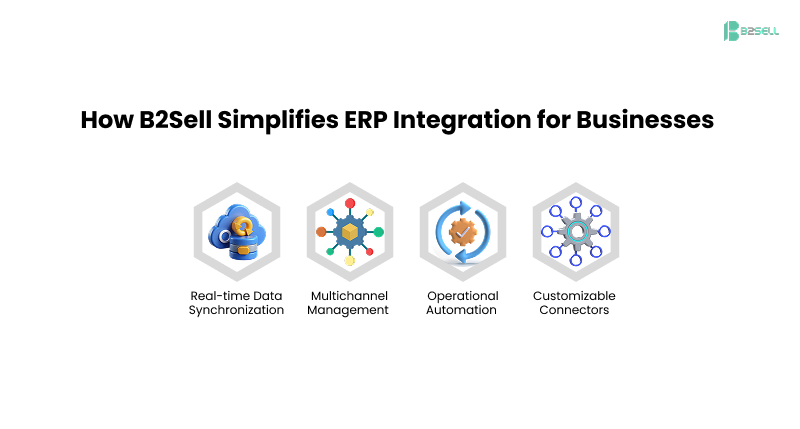
1. Real-time Data Synchronization
B2Sell ensures that all critical data—inventory levels, product pricing, and product details—is automatically updated across platforms in real time. This eliminates discrepancies between systems, reduces stockouts or overstock situations, and ensures customers always have accurate information when shopping online or in-store.
2. Multichannel Management
With B2Sell, businesses can centralize product, customer, and order information across multiple sales channels. Whether it’s an online eCommerce store, a physical retail outlet, or a mobile sales channel, data is consistent, reliable, and instantly available. This unified approach simplifies order management and improves the customer experience.
3. Operational Automation
B2Sell automates repetitive tasks like order fulfillment, invoicing, and reporting. By reducing manual intervention, businesses save time, minimize human errors, and accelerate operational workflows. Teams can focus on strategic activities rather than handling routine tasks.
4. Customizable Connectors
B2Sell supports a wide range of platforms and ERP systems, including Magento, Shopify, Salesforce, Epicor, NetSuite, SAP, QuickBooks, and more. These connectors can be customized to suit specific business processes, making it easy to integrate even complex or legacy systems without disruption.
By leveraging B2Sell’s ERP integration solutions, businesses gain a scalable, secure, and reliable system that improves operational efficiency, enhances customer satisfaction, and supports growth.
Learn more about B2Sell ERP Integrations →
FAQs
Q1. What is ERP system integration?
It’s the process of connecting your ERP with other enterprise systems for real-time data flow, improved efficiency, and automation.
Q2. How does ERP eCommerce integration help?
It synchronizes product catalogs, inventory, and orders, reducing errors and improving customer satisfaction.
Q3. Which ERP software systems are best for integration?
SAP, NetSuite, Microsoft Dynamics 365, Epicor, and QuickBooks are highly compatible.
Q4. Can ERP integration improve customer service?
Yes, real-time order tracking, accurate inventory, and centralized customer data improve response time and satisfaction.
Q5. How do I implement ERP integration?
Evaluate your systems, define goals, automate critical processes, and partner with B2Sell for seamless implementation.
Future Trends in ERP Integration
- AI-Driven ERP: Predictive analytics for inventory, sales forecasting, and customer behavior
- Cloud-Based ERP Integrations: Flexible, scalable, and remote-accessible
- IoT Integration: Real-time monitoring of assets, production, and logistics
- Omnichannel Commerce: Fully synchronized online, offline, and mobile channels
Conclusion
ERP system integration is crucial for businesses looking to streamline operations, reduce errors, and improve customer experiences. By integrating ERP with eCommerce, CRM, and PIM systems, businesses gain:
- Real-time data insights
- Automated workflows
- Improved efficiency and customer satisfaction
- Scalable growth
B2Sell ERP Integrations provide seamless multi-platform connectivity, automated workflows, and reliable real-time synchronization, making your ERP integration hassle-free.

.png)

.png)
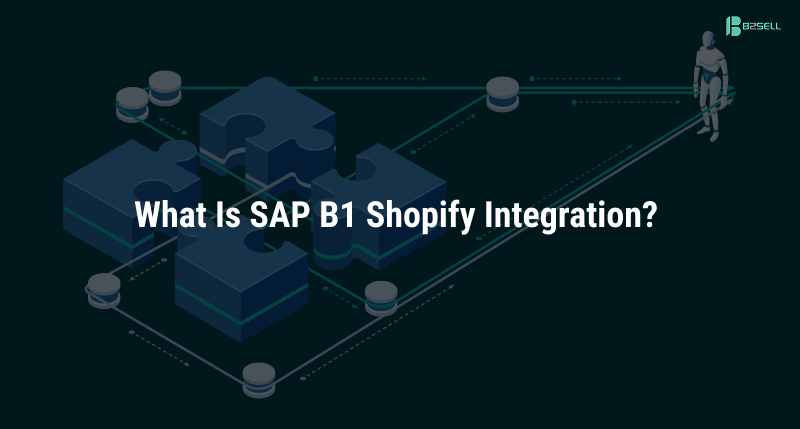


.png)